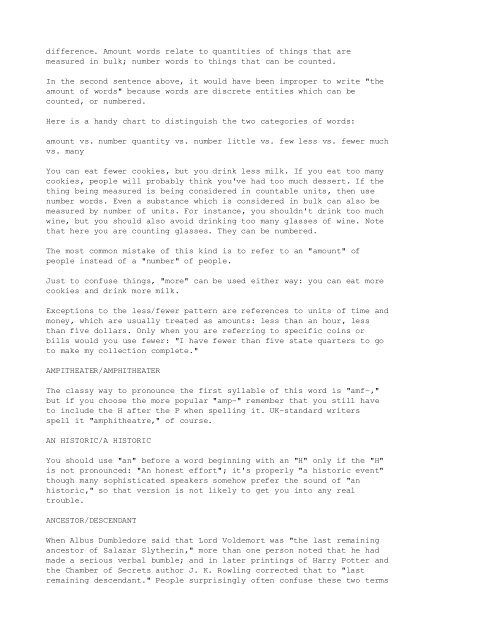Common_Errors_in_English_usage
Common_Errors_in_English_usage
Common_Errors_in_English_usage
You also want an ePaper? Increase the reach of your titles
YUMPU automatically turns print PDFs into web optimized ePapers that Google loves.
difference. Amount words relate to quantities of th<strong>in</strong>gs that are<br />
measured <strong>in</strong> bulk; number words to th<strong>in</strong>gs that can be counted.<br />
In the second sentence above, it would have been improper to write "the<br />
amount of words" because words are discrete entities which can be<br />
counted, or numbered.<br />
Here is a handy chart to dist<strong>in</strong>guish the two categories of words:<br />
amount vs. number quantity vs. number little vs. few less vs. fewer much<br />
vs. many<br />
You can eat fewer cookies, but you dr<strong>in</strong>k less milk. If you eat too many<br />
cookies, people will probably th<strong>in</strong>k you've had too much dessert. If the<br />
th<strong>in</strong>g be<strong>in</strong>g measured is be<strong>in</strong>g considered <strong>in</strong> countable units, then use<br />
number words. Even a substance which is considered <strong>in</strong> bulk can also be<br />
measured by number of units. For <strong>in</strong>stance, you shouldn't dr<strong>in</strong>k too much<br />
w<strong>in</strong>e, but you should also avoid dr<strong>in</strong>k<strong>in</strong>g too many glasses of w<strong>in</strong>e. Note<br />
that here you are count<strong>in</strong>g glasses. They can be numbered.<br />
The most common mistake of this k<strong>in</strong>d is to refer to an "amount" of<br />
people <strong>in</strong>stead of a "number" of people.<br />
Just to confuse th<strong>in</strong>gs, "more" can be used either way: you can eat more<br />
cookies and dr<strong>in</strong>k more milk.<br />
Exceptions to the less/fewer pattern are references to units of time and<br />
money, which are usually treated as amounts: less than an hour, less<br />
than five dollars. Only when you are referr<strong>in</strong>g to specific co<strong>in</strong>s or<br />
bills would you use fewer: "I have fewer than five state quarters to go<br />
to make my collection complete."<br />
AMPITHEATER/AMPHITHEATER<br />
The classy way to pronounce the first syllable of this word is "amf,"<br />
but if you choose the more popular "amp" remember that you still have<br />
to <strong>in</strong>clude the H after the P when spell<strong>in</strong>g it. UKstandard writers<br />
spell it "amphitheatre," of course.<br />
AN HISTORIC/A HISTORIC<br />
You should use "an" before a word beg<strong>in</strong>n<strong>in</strong>g with an "H" only if the "H"<br />
is not pronounced: "An honest effort"; it's properly "a historic event"<br />
though many sophisticated speakers somehow prefer the sound of "an<br />
historic," so that version is not likely to get you <strong>in</strong>to any real<br />
trouble.<br />
ANCESTOR/DESCENDANT<br />
When Albus Dumbledore said that Lord Voldemort was "the last rema<strong>in</strong><strong>in</strong>g<br />
ancestor of Salazar Slyther<strong>in</strong>," more than one person noted that he had<br />
made a serious verbal bumble; and <strong>in</strong> later pr<strong>in</strong>t<strong>in</strong>gs of Harry Potter and<br />
the Chamber of Secrets author J. K. Rowl<strong>in</strong>g corrected that to "last<br />
rema<strong>in</strong><strong>in</strong>g descendant." People surpris<strong>in</strong>gly often confuse these two terms





